Advertising and marketing in South Africa offer exciting opportunities forlocal businesses in the country.
The country’s diverse market demands unique strategies to reach and engage consumers effectively.
Digital marketing plays a crucial role in South Africa. SEO, PPC, and social media are key tools for success.
As a South African business, you also need to deal with complex regulations and laws that affect business advertising. Understanding these rules is vital to avoid legal issues and maintain ethical practices.
To succeed in the South African market, you need a well-planned digital marketing strategy. This includes creating high-quality content, content distribution, improving your online presence, and measuring performance of your marketing efforts.
By focusing on these areas, you can effectively reach your target audience and grow your business.
Table of Contents
Key takeaways
- Digital marketing is essential for success in South Africa’s diverse market
- Understanding local advertising laws and regulations is crucial
- A well-planned strategy involving content, online presence, and performance analysis is key
About the South African Market
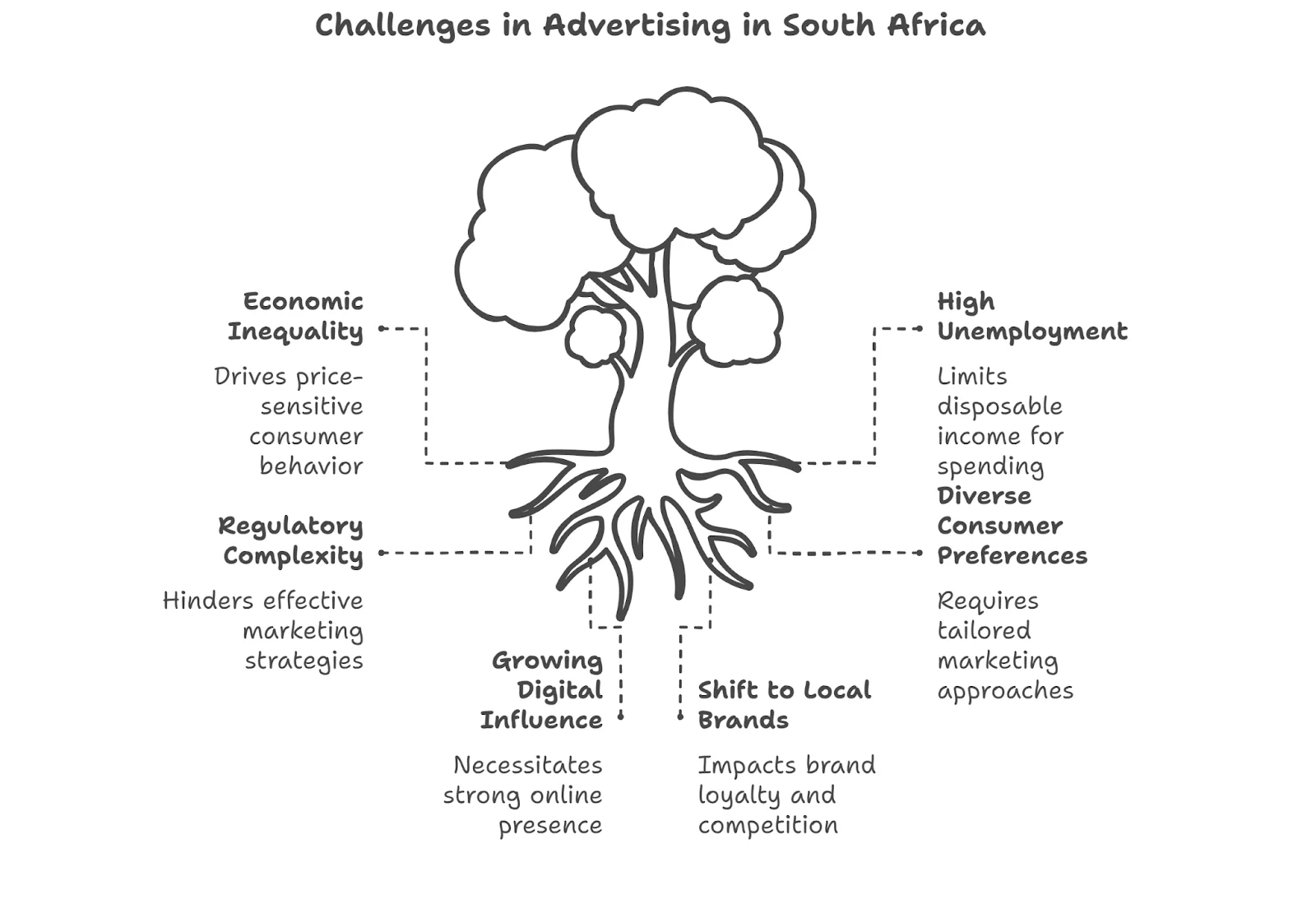
South Africa’s market presents unique opportunities and challenges for advertisers.
The country’s diverse population, economic landscape, and regulatory environment shape consumer behavior and marketing strategies.
Demographics and Consumer Behavior
South Africa has a young population with a median age of 28.1 years.
The country is home to a diverse mix of ethnic groups, with Black South Africans making up 80.9% of the population.
Urban areas house 68.3% of inhabitants, with Gauteng and KwaZulu-Natal provinces being the most populous.
What you need to know:
- Consumer behavior is heavily influenced by economic factors.
- South Africans are price-conscious and often compare options before making purchases.
- They value quality but are willing to switch to discounters or informal traders to save money.
Like several African markets such as Kenya and Nigeria, Online shopping is growing in popularity, driven by increasing internet penetration.
Social media plays a significant role in shaping consumer decisions, prompting retailers to boost their digital presence.
Economic climate and purchasing power
South Africa faces significant economic challenges, including high unemployment and income inequality.
The country’s Gini coefficient for wealth inequality stands at 0.76, indicating severe disparity.
The Gini coefficient, also known as the Gini index or Gini ratio, is a statistical measure used to quantify economic inequality within a population.
It provides insights into the distribution of income or wealth among individuals or households.
Scale of Measurement
The Gini coefficient ranges from 0 to 1 (or 0% to 100%):
- A Gini coefficient of 0 indicates perfect equality, where everyone has the same income.
- A Gini coefficient of 1 signifies perfect inequality, where one individual holds all the income while others receive none
Thus, a 0.76 gini coefficient is quite wanting.
The average household disposable income is around $9,338 per year. However, over half the population lives below the national poverty line. This economic divide heavily influences consumer spending patterns.
- Recent trends show a shift towards “cocooning” – preferring home entertainment over outings.
- Consumers are also embracing second-hand markets and collaborative platforms like Airbnb and Uber to stretch their budgets.
Regulatory Bodies and Legal Frameworks
The South African advertising industry is largely self-regulated. Key organizations overseeing the sector include:
- Association for Communication and Advertising (ACA)
- National Association of Broadcasters (NAB)
- Out of Home Media South Africa (OHMSA)
- The Advertising Regulatory Board (ARB)
The Advertising Regulatory Board enforces the Code of Advertising Practice, which governs advertising content.
Marketers must be aware of regulations around data protection, as consumers are increasingly concerned about privacy and cyber security.
South African consumers show a preference for local brands, especially in fashion. However, they’re generally open to international companies, particularly those from Western countries.
Brands that demonstrate social responsibility and authenticity tend to resonate well with the younger, more socially conscious demographic.
Developing an Effective Marketing Strategy
Creating a strong marketing strategy is key for South African businesses. It helps you reach your goals, use your marketing budget wisely, and blend old and new marketing methods.
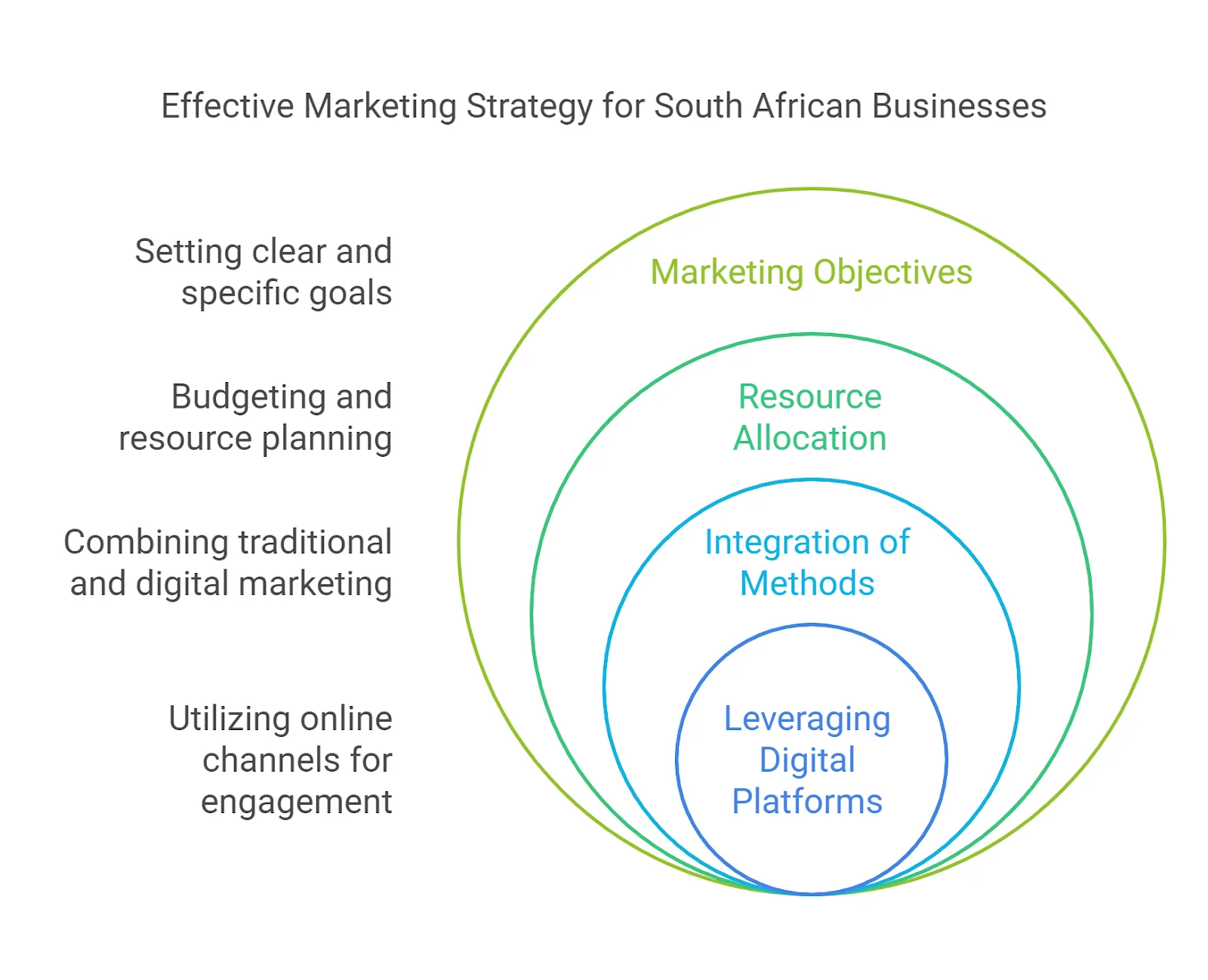
Identifying Marketing Objectives
Setting clear marketing objectives is crucial. Your goals should match your company’s bigger plans.
Think about what you want to achieve in the next year, two or more.
Some common objectives include:
- Boosting sales by a certain percentage
- Getting more customers in a new area
- Making more people know about your brand
Be specific when setting goals. Instead of saying “increase sales”, try “increase sales by 15% in the next 6 months”.
Remember to make your objectives SMART:
- Specific
- Measurable
- Achievable
- Relevant
- Time-bound
This approach helps you track your progress and know when you’ve succeeded.
Allocating Resources and Budgeting
Once you know your goals, decide how to use your money and people. This step is key to making your marketing work well.
Start by looking at what you spent last year. Did it work? What gave you the best results? Use this info to plan for the coming year.
Think about:
- How much can you spend?
- Which channels work best for your business?
- Do you need to hire new people or use outside help?
Make a clear budget for each part of your plan. This might include:
- Social media ads
- Print materials
- Website updates
- Event sponsorships
Be ready to change your budget if needed. Keep track of what’s working and put more money there.
Integrating Traditional and Digital Efforts
In South Africa, it’s smart to use both old and new marketing methods. This helps you reach more people and get better results.
Traditional methods still work well for established businesses:
- Radio ads
- Billboards
- Newspaper ads
- TV commercials
But don’t forget digital channels are more accessible to small businesses:
- Social media marketing
- Email campaigns
- Search engine optimization (SEO)
- Pay-per-click advertising
- Content marketing
The key is to make all these work together. For example, you could:
- Use a QR code on a billboard that leads to your website
- Share your TV ad on social media
- Mention your social media accounts in radio ads
By mixing these methods, you create a strong, unified message. This helps people remember your brand no matter where they see it.
Remember to test different approaches. See what works best for your target market and adjust your plan as needed.
Leveraging Digital Platforms
Digital platforms offer powerful tools for South African businesses to reach and engage customers.
These online channels provide cost-effective ways to boost visibility, drive traffic, and increase conversions.
Search Engine Optimization (SEO)
SEO helps your website rank higher in search results, helping more people to find your business online.
You want to think of SEO efforts as a conscious decision to place your brick and mortar shop at a strategic location where there’s lots of foot traffic.
To improve SEO, do the following:
- Use relevant keywords in your content
- Optimize page titles and meta descriptions
- Create high-quality, useful content
- Build backlinks from reputable sites
- Improve page load speed
- Make your site mobile-friendly
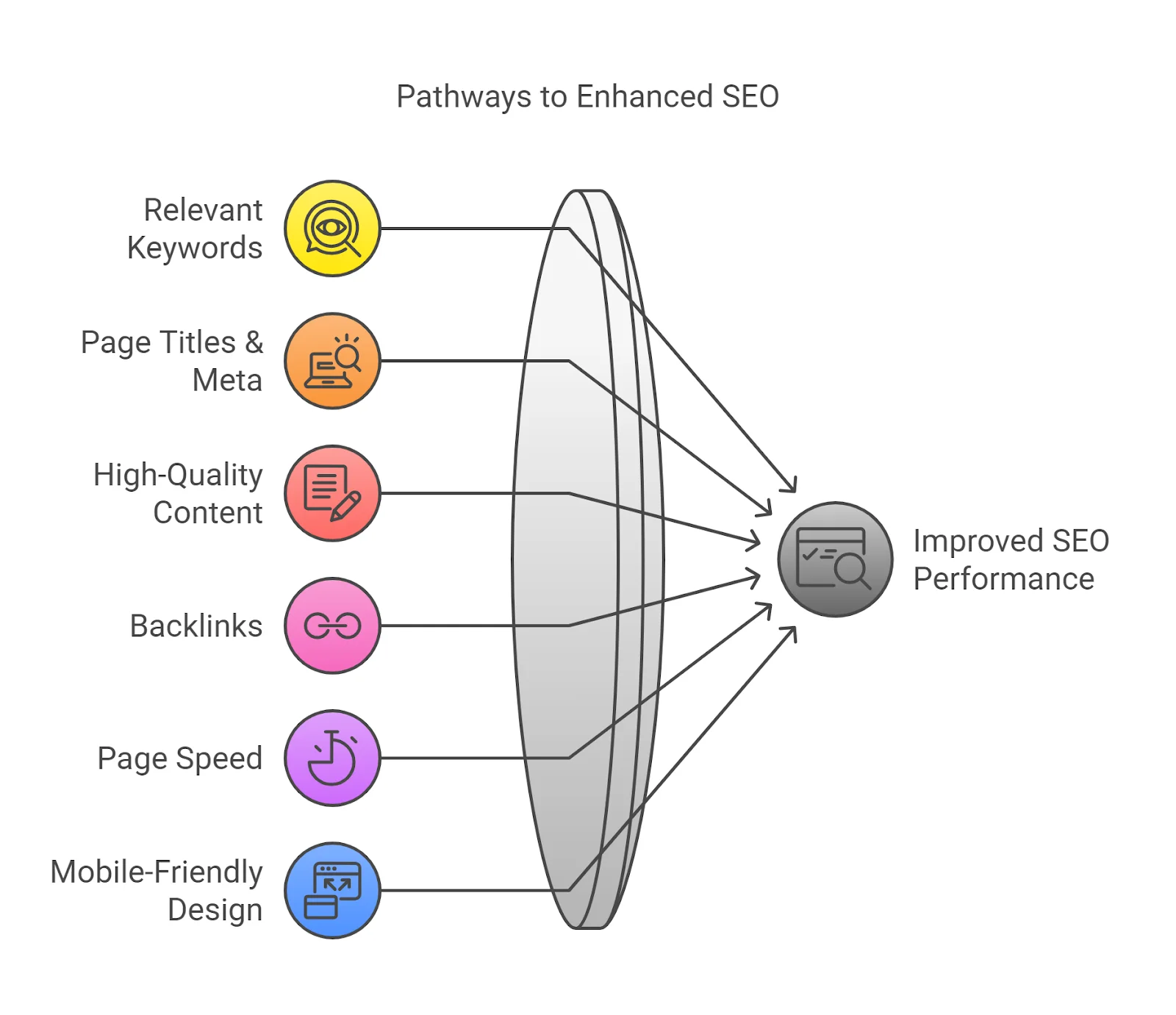
Local SEO
Focus on local SEO too.
Local SEO is essential for businesses aiming to attract customers from specific geographic areas.
Strategies for local SEO:
- Maintain NAP consistency across listing directories. NAP is short for Name, Address, and Phone number
Add your business to Google My Business and include location-specific keywords. This helps you show up in “near me” searches.
Optimize Your Google Business Profile
- Claim and Verify Your Listing: Ensure your Google Business Profile is claimed and verified to appear in local search results.
- Complete Your Profile: Fill out all sections, including business hours, services, and photos, to provide comprehensive information to potential customers.
Maintain NAP Consistency
Ensure Consistent Name, Address, Phone Number (NAP): Consistency across all online platforms helps build credibility and improves local rankings.
Check your listings on directories and social media for uniformity.
Local Keyword Research
- Target Local Keywords: Use tools like Semrush or Google Keyword Planner to identify keywords that your local audience is searching for. Focus on long-tail keywords that include your location for better relevance.
- Incorporate Keywords in Content: Use these keywords in your website’s titles, meta descriptions, and throughout the content to improve search visibility.
Create Locally Relevant Content
- Develop Location-Specific Pages: If you have multiple locations, create unique pages for each that highlight local offerings and incorporate relevant keywords.
- Publish Local Content: Write blog posts about local events, news, or guides that resonate with your community. This not only attracts traffic but also positions your business as a local authority.
Build Local Citations
- List Your Business in Online Directories: Ensure your business is listed in relevant online directories like Yelp, Yellow Pages, and local chambers of commerce. This enhances visibility and credibility.
- Use Local Data Aggregators: Distribute your business data through local data aggregators to ensure accurate listings across various platforms.
Manage Online Reviews
- Encourage Customer Reviews: Actively seek reviews from satisfied customers on Google and other platforms. Responding to reviews can improve engagement and show potential customers that you value their feedback.
- Monitor Your Reputation: Use tools to track reviews and manage your online reputation effectively. Brand management is a key aspect of branding and marketing that you can’t and shouldn’t ignore.
Optimize for Mobile
- Ensure Mobile-Friendliness: With a significant number of local searches conducted on mobile devices, (over 70% in South Africa), ensure your website is mobile-responsive. This includes fast loading times and easy navigation.
Leverage Social Media
- Engage on Social Platforms: Use social media to connect with the local community. Share updates, promotions, and engage with followers to increase brand awareness.
- Manage social media using a dedicated social media management tool like Publer, Buffer, Hootsuite, etc.
Build Local Backlinks
- Earn Backlinks from Local Sources: Collaborate with local businesses or sponsor events to gain backlinks from reputable local sites. This boosts your site’s authority and improves rankings.
- Create Shareable Content: Develop high-quality content that others in your community would want to link back to, such as infographics or detailed guides.
Implementing these strategies can significantly enhance your local SEO efforts, driving more traffic and increasing visibility within your target market.
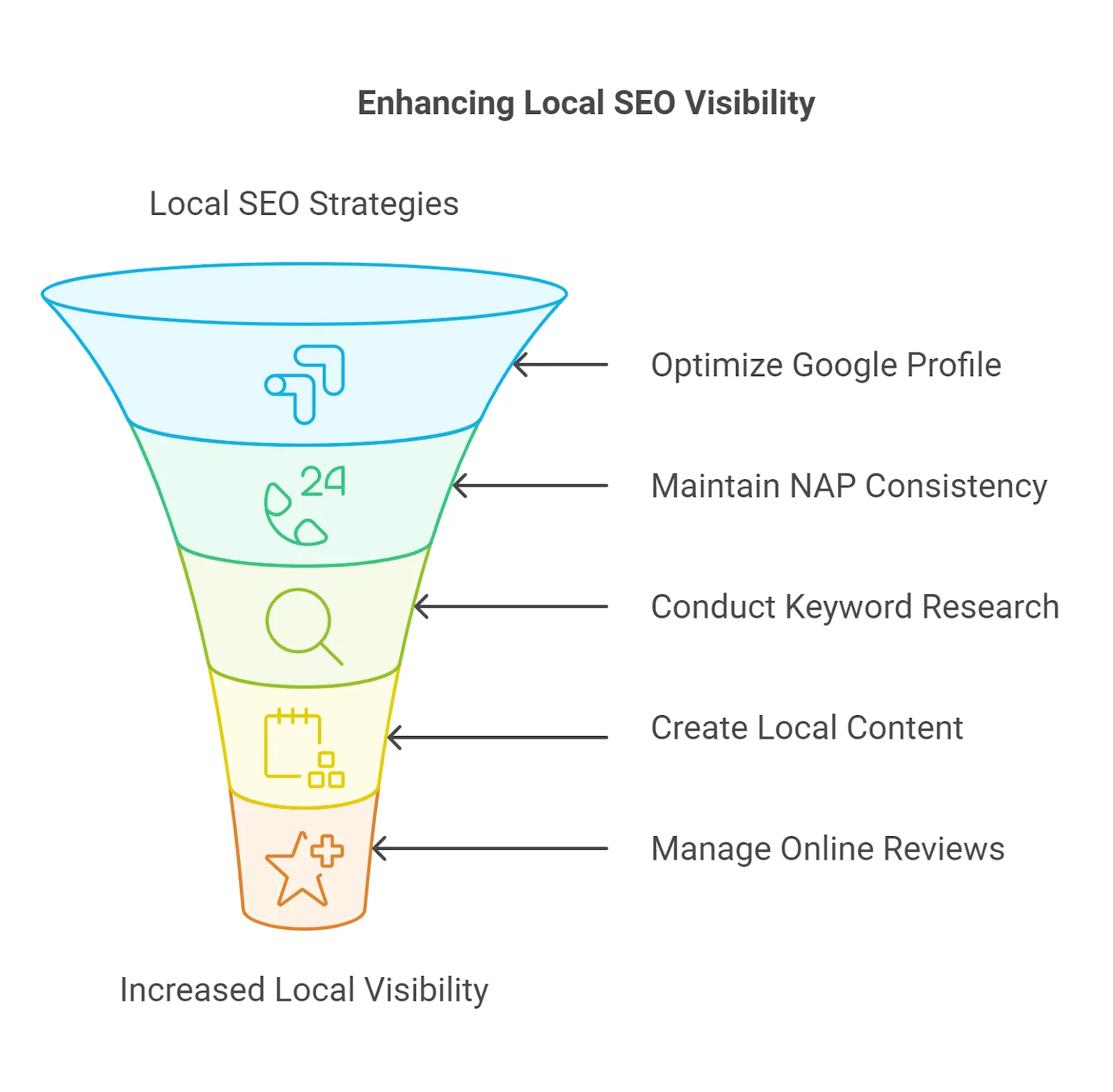
Content Marketing and Blogging
Content marketing attracts and engages your target audience. It builds trust and positions you as an expert. Key strategies include:
- Start a blog with helpful, informative posts
- Create videos, infographics, and podcasts
- Share customer success stories
- Offer free guides or ebooks
- Use email newsletters to share valuable content
Quality matters more than quantity. Publish content that solves your audience’s problems or answers their questions.
Online Advertising in South Africa (Google Ads, Meta Ads, and TikTok Ads)
Paid ads can quickly boost your visibility and drive targeted traffic. Google Ads is a powerful platform for South African businesses.
It lets you:
- Show up at the top of search results
- Target specific keywords, locations, and demographics
- Set your own budget and pay only for clicks
- Track performance and adjust campaigns in real-time
Google Analytics helps you measure the impact of your ads and optimize your campaigns.
- Add Google Analytics tag to your website
- Create a conversion goal
- Start monitoring your campaigns
Social Media Engagement and Advertising
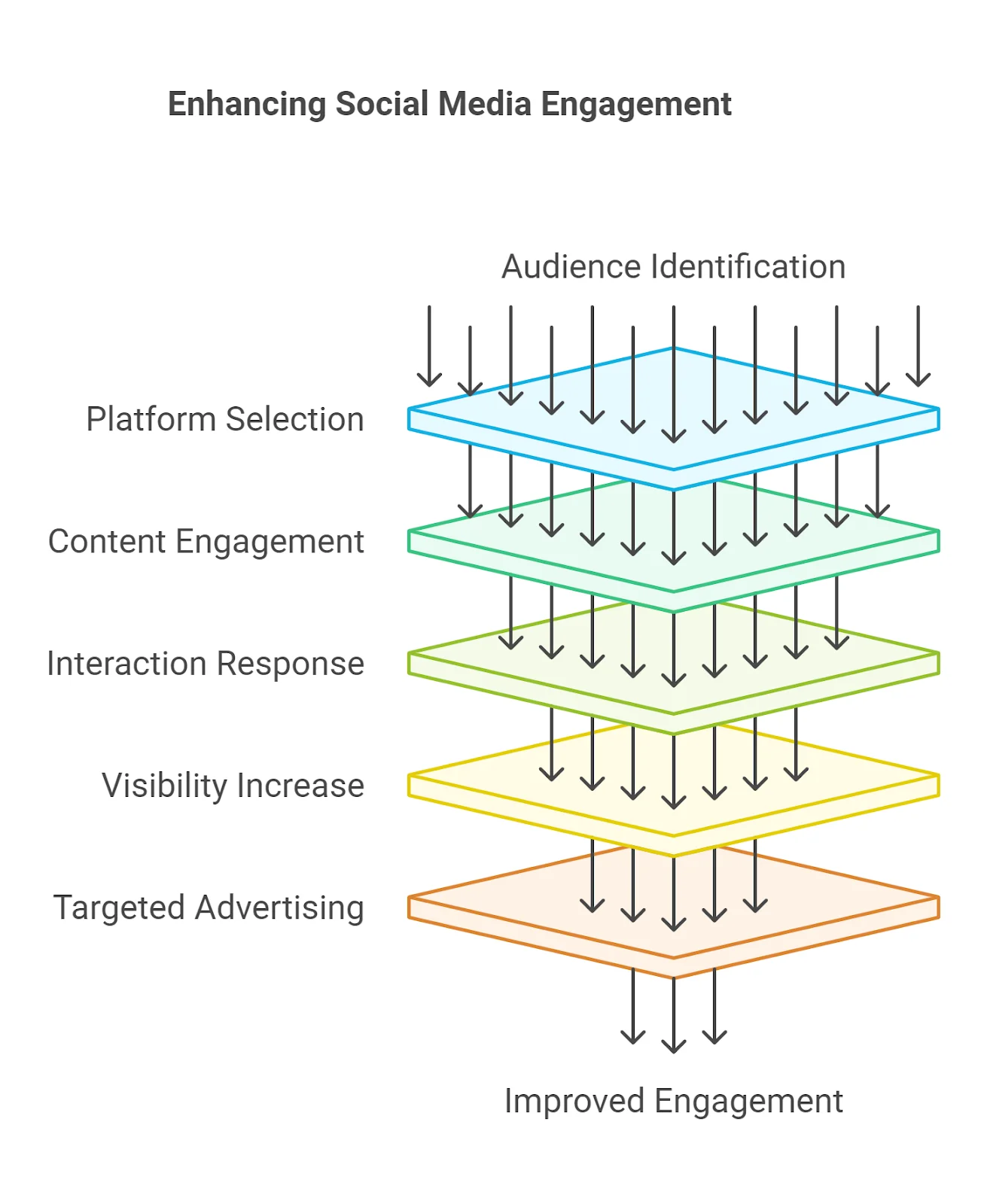
Social media platforms like Facebook, Instagram, TikTok and LinkedIn offer great ways to connect with South African customers.
To succeed:
- Choose platforms where your audience is active
- Post engaging content regularly
- Respond promptly to comments and messages
- Use hashtags to increase visibility
- Run targeted ad campaigns
Paid social ads let you reach specific demographics and interests. They’re often cheaper than traditional advertising methods.
AI & Automation
AI tools can streamline your digital marketing efforts. They save time and improve results.
Consider using AI for:
- Chatbots to handle customer queries
- Personalized email marketing campaigns
- Content creation and curation
- Social media post scheduling
- Data analysis and reporting
Automation tools like Hootsuite or Buffer help manage social media posts across multiple platforms. This ensures consistent posting and saves time.
Make.com is another great automation platform that your business should start exploring. With it, you can connect various tools and channels for seamless communication and transfer of data.
Website Optimization Strategies
Your website is often the first point of contact with potential customers. Make sure it loads fast and looks great on all devices.
Use responsive design to ensure your site works well on smartphones and tablets.
Keep your content fresh and relevant. Update your blog regularly with helpful info for your audience. This can improve your search engine rankings and keep visitors coming back.
Use clear calls-to-action (CTAs) on your pages. Make it easy for visitors to contact you, buy products, or sign up for newsletters.
Pay attention to your site’s structure. Use descriptive URLs, alt text for images, and proper header tags.
These small tweaks can boost your SEO and help users navigate your site.
Creating High-Quality Content
Good content is key to successful online marketing in South Africa, and essentially any market.
It helps you connect with your audience and build trust.
Let’s discuss how to create content that resonates.
User Intent and Interests
To create content that works, you need to know what your audience wants.
Start by researching popular topics in your industry. Use tools like Google Trends or social media listening to spot what people are talking about.
Look at the questions your customers often ask. These can be great starting points for blog posts or videos.
Pay attention to the language they use. This helps you write in a way that feels natural to them.
Think about the problems your products or services solve. Create content that addresses these issues directly. This shows you understand your audience’s needs.
Visual and Interactive Resources
People love visual content. It’s easy to understand and share.
Try making infographics that explain complex ideas simply. Use bright colors and clear designs that catch the eye.
Videos are powerful too. They can show your products in action or explain how to use your services.
Keep them short and to the point. Add captions for those who watch without sound.
Interactive content gets people involved. Try quizzes related to your industry or products. Or create calculators that help solve common problems your customers face.
Be sure to make your visual content mobile-friendly. Many South Africans browse on their phones, so your content should look good on small screens.
Measuring and Analyzing Performance
Tracking your marketing efforts is crucial for success in South Africa’s competitive environment.
You need to know what works and what doesn’t to make smart decisions.
Key Performance Indicators
Marketing performance measurement is vital for South African businesses. Focus on these key metrics:
- Conversion rates: Track how many leads turn into customers
- Return on investment (ROI): Measure the profit gained from your marketing spend
- Website traffic: Monitor visitor numbers and engagement
- Social media engagement: Look at likes, shares, and comments
- Customer acquisition cost: Calculate how much you spend to get each new customer
Use Google Analytics to track website performance. It’s free and gives you valuable insights into visitor behavior.
Set up custom dashboards to easily view your most important KPIs. This helps you spot trends quickly and make data-driven decisions.
Adapting Strategies Based on Data
Use your performance data to fine-tune your marketing approach. Here’s how:
- Identify top-performing channels and content
- Allocate more resources to what works best
- Test new ideas on a small scale before scaling up
- Adjust your messaging based on audience engagement
South African marketers who use metrics see better results. They can prove their impact and get more budget for successful campaigns.
Don’t be afraid to cut underperforming tactics. Redirect that spend to areas showing the best ROI.
Compliance and Ethical Advertising
Advertising in South Africa must follow strict rules to protect consumers and promote fair competition. Companies need to know these rules to avoid legal troubles and keep their good name.
Advertising Standards and Laws
Advertising regulations in South Africa aim to keep marketing honest and fair.
The Advertising Regulatory Board (ARB) sets rules for ads. They make sure ads don’t trick people or say false things.
The Consumer Protection Act is another key law. It stops companies from using unfair marketing tricks.
Ads must be clear and truthful about what they’re selling.
South African law also bans ads that:
- Discriminate against people
- Show violence or illegal acts
- Make health claims without proof
Breaking these rules can lead to fines or lawsuits. It’s smart for businesses to check their ads carefully before sharing them.
Intellectual Property Considerations
When creating ads, you need to be careful not to use other people’s ideas without permission. This includes:
- Logos
- Slogans
- Music
- Images
South African copyright law protects creative works. Using them without asking can get you in trouble.
Trademarks are also protected. You can’t use another company’s name or logo to sell your products.
To stay safe:
- Create your own content
- Get permission for anything you didn’t make
- Check if names or designs are already trademarked
Marketing in SA FAQs
Digital marketing in South Africa is changing fast. New trends and rules affect how businesses reach customers.
What are the leading digital marketing trends currently shaping the industry in South Africa?
Mobile marketing is huge in South Africa. Most people use phones to go online. Smart marketers focus on mobile-friendly ads and websites.
Social media marketing is also big. Facebook and Instagram are popular. Many brands use these platforms to connect with customers.
Video content is growing fast. Short videos on TikTok and YouTube grab attention. Brands are making more video ads to reach younger audiences.
What steps are involved in starting a digital marketing campaign for a business in South Africa?
First, set clear goals. Decide what you want to achieve with your campaign.
Next, know your audience. Research who you’re trying to reach and what they like.
Choose the right channels. Pick platforms where your audience spends time.
Create engaging content. Make ads and posts that speak to your audience.
Set a budget. Decide how much you’ll spend on ads and other marketing efforts.
Track results. Use tools to measure how well your campaign is doing.
Which digital marketing strategies are most effective for engaging consumers in South Africa?
Email marketing works well. It’s a cheap way to reach customers directly.
Influencer marketing is popular. Working with local social media stars can boost your brand.
Content marketing helps build trust. Sharing useful info can turn readers into customers.
Pay-per-click ads on Google and social media can drive quick results. They help you reach people searching for your products.
How have recent legislations affected the advertising and marketing industry in South Africa?
New privacy laws have changed how marketers collect and use data. You need permission to send marketing emails now.
The Advertising Standards Authority sets rules for ads. They make sure ads are honest and fair.
Health product ads have strict rules. The Health Professions Council of South Africa limits how medical pros can advertise.
Which social media platforms deliver the highest ROI for advertising campaigns in South Africa?
Facebook often gives the best return. It has a huge user base and good targeting options.
Instagram works well for visual brands. It’s great for reaching younger audiences.
LinkedIn is top for B2B marketing. It helps you connect with business decision-makers.
Twitter can be good for real-time marketing. It’s useful for sharing news and updates.
TikTok is growing fast. It’s becoming a key platform for reaching Gen Z consumers. I recommend you try TikTok Ads to boost number of followers before running conversion campaigns. It’s cheap compared to Meta Ads.


